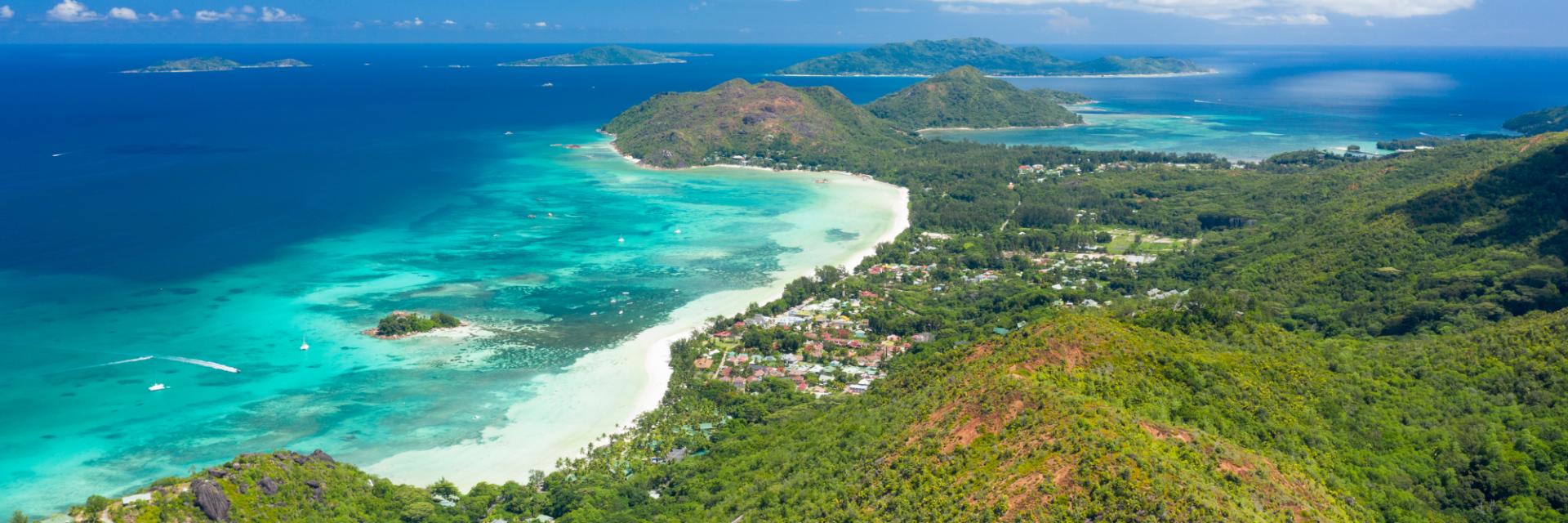Dubai, United Arab Emirates, 8 December 2023 (ECA) - African Small Island Developing States (SIDs) have pressed for adaptation finance to fight climate change impacts threatening livelihoods and their future survival. They made the call during a side event held by the African Island State Climate Commission (AISCC) on the theme, ‘Transitioning to a Climate Resilient Future.’
Cape Verde, Comoros, Equatorial Guinea, Guinea-Bissau, Madagascar, Mauritius, Sao Tome and Principe, Seychelles and Zanzibar comprise the African members of the Small Island Developing States, a group of low-lying island nations with a combined population of 4 million people and extremely vulnerable to climate change impacts. African SIDS are located in remote, low lying areas that are vulnerable to sea level rise and cyclones. Furthermore, their economies are primarily based on tourism and fisheries.
Seychelles Minister of Agriculture and the Environment, Flavian Joubert, stressed that African SIDS are particularly vulnerable to climate change shocks, making it imperative for immediate action to protect people, economies and the environment. Mr. Joubert, whose country is the chair of the African Islands States Commission, called on major emitters to develop more ambitious plans to keep the goal of limiting global warming to 1.5 Degree Celsius.
“Like all Africa, Seychelles views climate change as an emergency challenging all aspects of its chances for future survival and undermines efforts to fully achieve sustainable development goals,” Mr. Joubert noted, adding, “We need to find common ground and expect outcomes from the negotiations on the global goal for adaptation and that should not lead to further delays in strengthening adaption action, particularly for African Island States.”
African SIDs experience the impacts of climate change with acute vulnerability to weather, seismic and oceanographic events making them particularly vulnerable because their economies are anchored on tourism and fisheries. Among other issues, While they share common characteristics of insularity and geographical disparity as well as small populations their vulnerability is not uniform; they have varied experience of climate change and capacity to address them. Comoros, Guinea Bissau and Saõ Tome and Principe are all LDCs while Cape Verde, Mauritius and the Seychelles have higher levels of development as well as policies and better mechanism to address climate change, Due to their varying economies, they face difficulties accessing green climate financing.
Anthony Nyong, Director Climate Change and Green Growth, African Development Bank (AfDB) said the bank has resources and programmes to promote resilience for Island States which faced different vulnerabilities than most countries.
For his part, Nassim Oulmane, Acting Director for Technology, Climate Change and Nature at the Economic Commission for Africa, said the ECA was working on a readiness project proposal for countries to access the Green Climate Fund. Furthermore, ECA was working on finalizing a regional request for the 9 African Islands States so they can mobilize funding for adaptation from the Green Climate Fund.
“We are also working on better valuing blue carbon and implementing protocols that are specific to the African Island States as we have done with the Congo Basin by also putting together a blue carbon registry,” Mr. Oulmane said.
Kavydass Ramano, the Minister of Environment, Solid Waste Management and Climate Change in Mauritius, called for innovative solutions to secure a resilient future for African SIDS, stressing that, “there is no plan B as we are all subjected to either prolonged spells of extreme droughts or floods caused by torrential rainfall.”
He said Mauritius has advocated for an ecosystem adaptation through nature-based solutions under its 2021-2030 National Determined Contribution (NDC).
“The small island of Sao Tome and Principe is vulnerable to climate change impacts experiencing high sea level rise which is threatening coastal communities and needs funding to implement coastal protection programmes,” said Adelino Cardoso, Minister of Infrastructure, Natural Resources and Environment in Sao Tome and Principe.
Tania Serafim Romualdo, Cabo Verde Ambassador to the United Nations, told the panel discussion that her country has developed the Blue-x in partnership with Carbo Verde Stock Exchange and the United Nations Development Programme. Blue-x is a trading platform for sustainable and inclusive financial instruments geared towards a sustainable economy, for example, issuance of blue bonds and green bonds.
Ms. Ramualdo said Cabo Verde has also instituted a bilateral swap with Portugal and successfully negotiated the transformation of 140 million Euros in debt held by the Portugal treasury into a Climate and Environment Fund. The Fund will provide seed capital for a comprehensive energy transition strategy to achieve net zero carbon emissions by 2050.
While climate change affects the development of all nations regardless of location or economy size, the 38 SID countries located in the Caribbean, the Pacific, the Atlantic, Indian Ocean and South China Sea are responsible for less than 1 percent of global greenhouse gas (GHG) emissions AND are the most vulnerable to its devastating impacts.
The side event was hosted by the government of Seychelles, in collaboration with the Economic Commission for Africa, the African Union Commission, the African Development Bank and the Office of the Special Advisor on Africa, OSAA at COP28 in Dubai.
Issued by:
Communications Section
Economic Commission for Africa
PO Box 3001
Addis Ababa
Ethiopia
Tel: +251 11 551 5826
E-mail: eca-info@un.org

